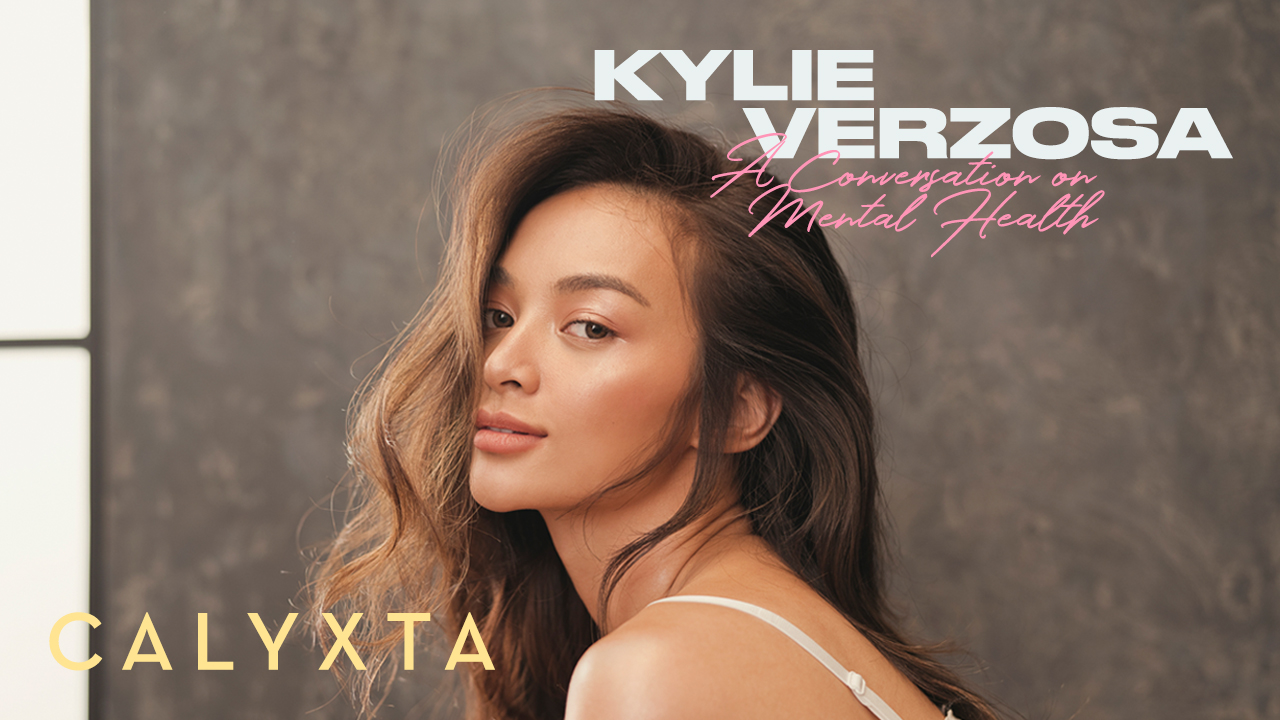
When I started as Calyxta’s Managing Editor in July 2017, I wanted to continue the online magazine’s initiative of featuring women who weren’t just beautiful on the outside, but more so on the inside. I know it seems cliché, but this is precisely the reason why our cover stories, in one way or another, always include an advocacy or a story that shows just how human our cover girls are.
Days before our editorial shoot with current #CalyxtaGirl, Kylie Verzosa, I remember brainstorming on the interview questions with my team, and thinking to myself, “Wow, I can’t wait to sit down and really get to know Kylie on a deeper level.” And this particular cover story of hers is perhaps my favorite, because it hits very close to home. I was so grateful that Kylie was more than willing to share her experiences, and it really did move me to see how much she’s in a better place and a healthier state of mind.
We tackled topics to hopefully end the stigma on mental health, and aside from advice to those who are too afraid to seek professional help, she also shared ideas to those who have loved ones currently going through depression.
Read more on our interview below:
Even before your reigning days as a beauty queen, you’ve been an advocate of mental health due to your own personal experience and struggles. How was your journey like and how did you overcome it?
When I was undergoing depression, I felt that there wasn’t enough information, and I think this was in 2013 or 2012. There wasn’t enough information out there for me to see what I had. I didn’t understand it. And at that time, I was ashamed to tell my friends about it. I just thought I was weird, and I thought that they didn’t understand. There wasn’t really anyone out there who was talking about depression. I didn’t even know what that was. So, it was very difficult for me because I couldn’t talk to my friends about it.
But I’m super thankful because my dad helped me through it. I had a good support system. Still, it was very difficult for me, so when (I was) given the opportunity to speak about what I wanted to talk about, I was like, “I want to talk about mental health.” At first, they were like, “But isn’t that a sad advocacy? Why don’t you talk about something else? Something happier?” But I was like, “But this is something very close to me. It’s a personal journey of mine. It’s something I’ve been through. It’s something that I want to do something about. It’s something I want to put out there and give more information about to the general public.” And I guess my advocacy slowly unfolded when people were asking why I was doing it. Little by little, they found out I went through it myself. And you know what? I think there’s power in vulnerability. When you show that, you know, you’re not always strong, you’re not always beautiful. You’re a normal human being. You go through the ups, you go through the downs, and sometimes the downs are even lower than usual. So yeah, that’s how my advocacy began.


You created your own organization entitled Mental Health Matters because you wanted to spread awareness on mental health and end the stigma. What are your plans for it this year?
I think we’re on our 4th or 3rd year now. Actually, we started on Facebook. It started as a support group. It wasn’t anything much—I actually just wanted to share the articles that helped me through my depression, because I learned a lot online, and I had to research what I had and how to cure it naturally, or what were the best ways to get over it.
So, this is a place where I shared articles that helped me and then in a way, I also wanted to build a group where people felt like they belonged, or where people felt that, “Hey, I’m not alone,” because that’s the one thing that helped me heal right away—knowing that I’m not alone or that someone’s going through the journey with me, or someone is experiencing the same thing that I’m experiencing. So, the community alone has helped. I think we’re a growing community of around 5,000—it’s super active until now. I have a few volunteers who are constantly responding. You know, we get hundreds of messages a day, and sometimes if you look at it, I have to admit that it’s a bit draining. Like it makes me sad, because mabigat siya. Mabigat siya sa puso. I can only go there maybe once a week and check what’s happening, but otherwise, I get people to help me with it. My plans for it—hopefully in the future, I finally make it into a foundation. We’ve had two major events where we gathered people who are remarkable in the mental health industry, and we gave talks. Members of my organization still go around schools maybe every month. We talk about mental health, positive attitude, and self-love.
Many are still afraid of seeking help when it comes to dealing with depression. Instead of getting treatment and help, they remain silent. As an active mental health advocate, what tips would you give for individuals who are trying to cope with depression?
Don’t be ashamed about it. Seek professional help. I think that’s one thing that has also helped me a lot. When I sought professional help. I think it’s very important because sometimes, especially the younger kids today, they can be stubborn. They don’t want to listen to either of their parents, they don’t want to listen to their friends. Sometimes, having someone professional to talk to gets them to listen when they’re diagnosed. Two, listen to what they prescribe to you—whether it’s medication or whether it’s time off from work or from school. And then, it’s very important to have a good support system. Like, I personally had to alienate myself from people who I thought were bringing me down. It’s very important for you to be aware, and when you’re depressed, you tend to cling on to people or things, that you have a difficult time with your decision-making. So, talking to someone or going through therapy is crucial. A psychiatrist or psychologist will do that, and there’s really no shame in going.


Depression isn’t a solitary illness because it affects loved ones as well. Do you have any advice to those who want to support and help, but don’t know how?
That’s so true because on the other end of the spectrum, if you’re dealing with someone who is depressed, they tend to push you away, but they don’t realize it. It’s not your fault. It’s not because they don’t want you to be there. It’s just that sometimes, they don’t understand themselves. Or they feel they might be bothering you, so sila na lang yung lumalayo.
So for the person who is handling the depressed person, patience is very, very important. Patience, and trying to understand what they’re going through. Maybe slowly putting it in there, “Hey, do you want me to accompany you, or maybe we can talk to someone, or maybe we can seek professional help? Have you visited a psychiatrist?” Stealthily. Say that stealthily. You have to be very careful. Or saying things like, “I’m here for you. I love you. Let me know if you need any help. Let me know if you want to talk.” Because you do need to give them some space. Just genuinely listening and being there for them, and really meaning it. Don’t say things like, “Snap out of it. Tomorrow’s a new a day,” or “Nag-iinarte ka lang,” or “There are other people who have it worse than you. You should count your blessings.”
People need to understand that depression is not sadness. Depression is a sickness that can be treated, and that can be cured. Sadness is an emotion. It’s a fleeting moment. For example, when your boyfriend breaks up with you, or when you fail a test, or when your boss gets mad at you. It’s an emotion that could change quickly. But depression—it’s two weeks of immense feelings of sadness that you can’t control. Your hormones or the chemicals in your brain are imbalanced so it needs to be treated.

There are many misconceptions about mental illnesses, especially from older generations. What are the common misconceptions you’d like to further educate people about?
So many! When they talk about mental health, the first image they see is probably someone baliw, a crazy person on the street, or taong grasa. When they say, “May sakit sa ulo, dalhin na yan sa mental.” They may be the extreme cases of mental health, but it’s not everything. It’s just that mental health is so broad, but right now what the youth are facing are anxiety and depression. So I think we need to educate the older generation that that one is real. It needs to be treated, before it gets worse. Because if left untreated, this can lead to suicide. And yeah, to just be more understanding of it.


Cover Story: Gretchen Gatan
Art Direction: Julia Benito and Trixi Ruiz
Makeup Artist: Anthea Beuno
Hairstylist: Mong Amado
Wardrobe Stylist: Adrianne Concepcion
Photographer: Charisma Lico
Videographer: Andrew Apuya




